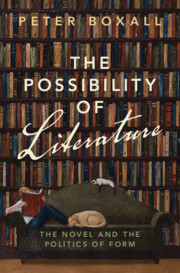Refine search
Actions for selected content:
5 results
Chapter 6 - The Scottish Postmodern Novel?
-
-
- Book:
- The Cambridge Companion to British Postmodern Fiction
- Published online:
- 07 August 2025
- Print publication:
- 21 August 2025, pp 97-112
-
- Chapter
- Export citation

The Possibility of Literature
- The Novel and the Politics of Form
-
- Published online:
- 10 October 2024
- Print publication:
- 05 September 2024
Chapter 5 - A Cleaving in the Mind
- from Part I - On Writers
-
- Book:
- The Possibility of Literature
- Published online:
- 10 October 2024
- Print publication:
- 05 September 2024, pp 104-116
-
- Chapter
- Export citation
Chapter 13 - Shallow Intensity
- from Part III - On the Contemporary
-
- Book:
- The Possibility of Literature
- Published online:
- 10 October 2024
- Print publication:
- 05 September 2024, pp 275-290
-
- Chapter
- Export citation
Chapter 18 - Neoliberalism
- from Part III - 1989–2000: Rights and Activisms
-
-
- Book:
- The Cambridge Companion to Twentieth-Century Literature and Politics
- Published online:
- 01 December 2022
- Print publication:
- 15 December 2022, pp 307-322
-
- Chapter
- Export citation
